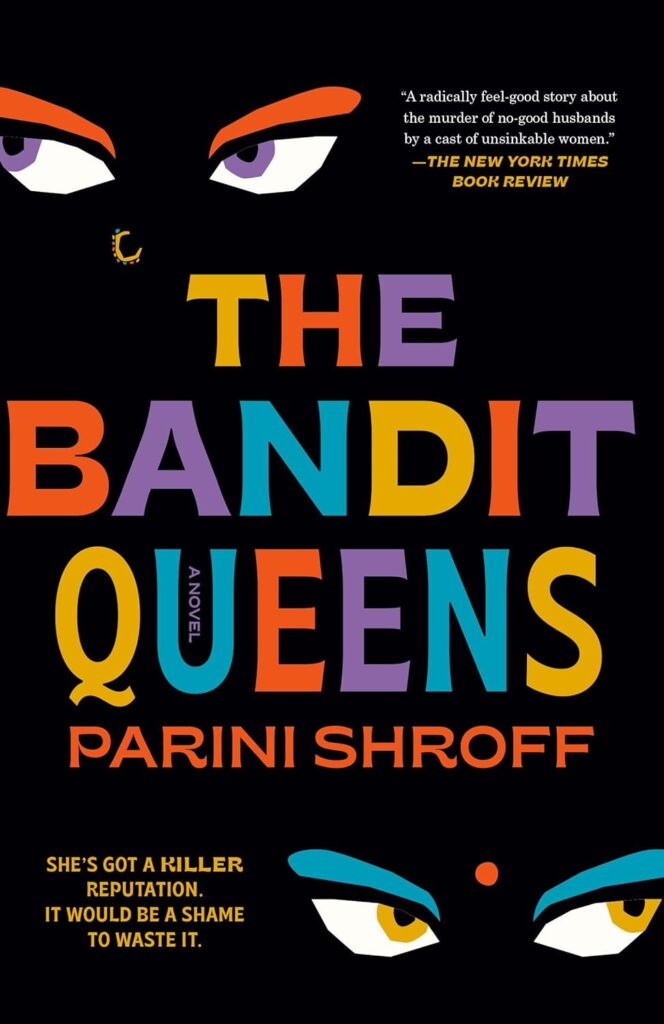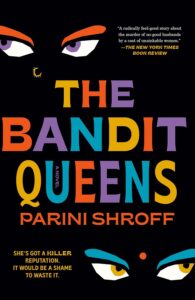The Bandit Queens. Shroff, Parini. New York : Ballantine Books, [2023].
Content warnings: misogyny, classism, body shaming, rape and attempted rape, sexual assault, domestic violence, alcoholism, acid attacks, murder.
Sometimes you pick up a book, expecting one thing, but get something else entirely. I picked up The Bandit Queens, expecting something similar to the Finlay Donovan and Aunties series. As you can see from the content warnings, this book (at least in some ways) is much deeper than those series, and deals with some pretty heavy topics. But it still made me laugh and cheer these women on as they deal with their no-good husbands!
Everyone in the village believes Geeta killed her husband. He disappeared several years ago, leaving her not all that upset, considering he abused her, and blamed her for their childlessness. Geeta is a loner, but (she thinks) she’s happy that way. She is feuding with her childhood best friend, Saloni, whom she sees every week at their microloan group meeting. Also part of their microloan group are twins Priya and Preity, and Farah. When Farah doesn’t show one week, Geeta pays her share of the loan. She visits Farah and finds out her husband beats her. Farah begs her to help kill her husband, and when Geeta hears him threaten to beat her up, too, and steal her hard-earned money, Geeta agrees.
Of course, once the others hear, Preity decides her husband has to go, too (after all, he threw acid at her before they got married and ruined her face). Geeta is horrified. She feels extreme guilt after helping Farah, and she certainly doesn’t want to help Preity as well. She thinks, why does everyone jump to the conclusion that their husbands have to die? When Farah decides to blackmail her for her involvement, Geeta really regrets starting down this path!
There are many laugh out loud parts of this book. Geeta begins the book as a loner and ends it with a wonderful group of friends, a dog, and a romantic partner as well. The deaths are original and interesting, and the characters pop off the page. The book pokes fun at how women complain about their offspring, but always follow it up with how blessed they are to be mothers and how it is so rewarding.
On the serious side, this book discusses caste in a way that is at least in part educational for someone outside the system, as well as poverty, spousal abuse, honor killings/acid attacks, rape, and other indignities women face in India as well as all over the world. The women discuss why women are blamed when men can’t control themselves, and why it is okay to rape a woman if she is your wife. I thought Shroff did an excellent job of integrating these issues into the story so it feels natural for the characters to discuss them.
Because I am not from India, I cannot address the concerns some readers have about the stereotypes her story may perpetuate, except to say that I see their point. You could read this book and picture the entirety of India as a poor place with bad sanitation, extreme poverty and backwards people who believe someone’s caste and/or religion makes them untouchable. However, I will acknowledge this deficiency and still say I really enjoyed this book! I will look for other books set in and written by people from India to further my knowledge.
Mary Beth Adams is the Community Engagement Librarian for Alamance County Public Libraries. She can be reached at madams@alamancelibraries.org.


